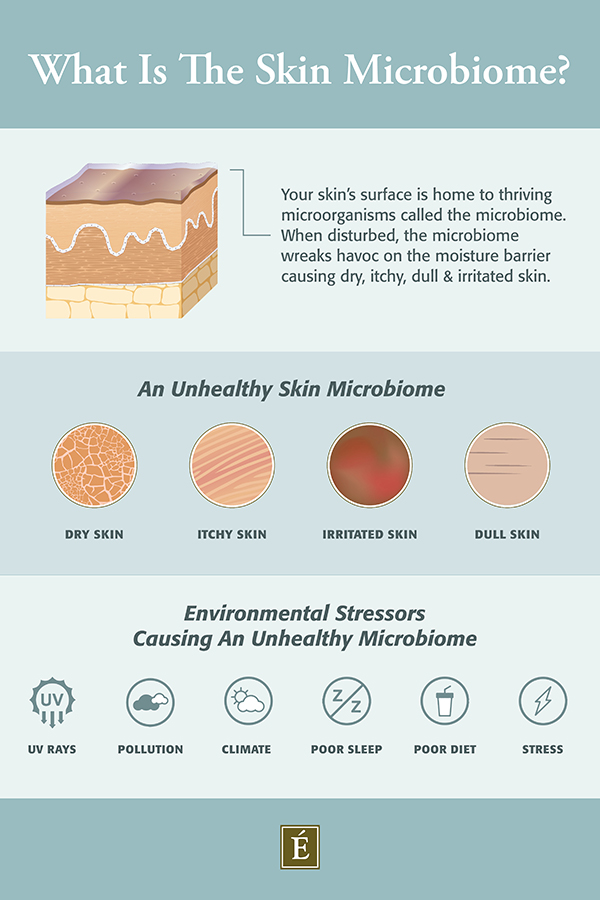Skin Microbiome and Personalized Skincare - The Future of Healthy Skin?

For decades, the focus of skincare has been on cleansing and treating the surface of our skin. But what if the secret to truly healthy, radiant skin lies beneath the surface, within a complex ecosystem of microorganisms known as the skin microbiome?
Unveiling the Skin's Invisible World: What is the Skin Microbiome?
Our skin is not just an outer layer; it's a thriving ecosystem teeming with trillions of bacteria, fungi, viruses, and even mites. This diverse collection of microorganisms, collectively called the skin microbiome, plays a crucial role in maintaining skin health.
Think of your skin microbiome as a delicate balancing act. When in harmony, these microbes act as our first line of defense against pathogens, help regulate the skin's pH, and even influence how our skin ages. Disruptions to this delicate balance, however, can contribute to a range of skin issues like acne, eczema, rosacea, and even premature aging.
Factors Influencing Our Skin Microbiome
While research on the skin microbiome is still in its early stages, scientists are uncovering a complex interplay of factors that can influence its composition and function. These include:
- Genetics: Our genes can influence the types and diversity of microbes that reside on our skin.
- Environment: Factors like climate, pollution levels, and UV exposure can impact the microbial balance.
- Lifestyle: Diet, stress levels, sleep quality, and even exercise habits can affect the skin microbiome.
- Skincare Products: The products we use, from cleansers to moisturizers, can significantly alter the microbial environment of our skin.
The Promise of Personalized Skincare
Understanding the intricate relationship between our skin microbiome and overall skin health paves the way for a new era of personalized skincare. Instead of a one-size-fits-all approach, personalized skincare aims to tailor products and routines to an individual's unique skin microbiome.
Data-Driven Insights:
Advancements in DNA sequencing technology have made it possible to analyze the composition of an individual's skin microbiome with incredible detail. Start-ups and established skincare companies are leveraging this technology to offer at-home skin microbiome testing kits. These tests typically involve swabbing different areas of the face and sending the samples to a lab for analysis.
Targeted Treatments:
Armed with a deeper understanding of an individual's skin microbiome, personalized skincare routines can be crafted to address specific concerns:
- Probiotic and Prebiotic Skincare: Products containing probiotics (live beneficial bacteria) and prebiotics (food sources for good bacteria) are gaining popularity for their potential to restore microbial balance and improve skin health.
- Customized Ingredient Selection: Knowing which microbes are thriving or lacking on your skin can guide the selection of ingredients that support a healthy microbiome. For example, those with acne-prone skin may benefit from ingredients that target specific bacteria strains linked to breakouts.
- Personalized Regimen Adjustments: Microbiome analysis can reveal if your current skincare routine is working harmoniously with your skin. It can help determine the optimal frequency of cleansing, exfoliation, and product application based on your unique microbial needs.
The Future of Skincare: A Balancing Act
While the concept of personalized skincare based on the skin microbiome holds immense promise, it's crucial to approach it with realistic expectations. The field is still young, and further research is needed to fully understand the complex interplay of factors influencing skin health.
It's also important to note that simply adding probiotics to existing products won't magically solve all skin woes. Creating effective personalized skincare requires a holistic approach that considers an individual's genetics, lifestyle, environment, and existing skincare habits alongside their microbiome profile.
Final Thoughts:
The burgeoning field of skin microbiome research has the potential to revolutionize how we approach skincare. By unraveling the secrets of this invisible ecosystem, we are moving towards a future where skincare is not merely about masking imperfections but about nurturing the delicate balance of life that resides on our skin.













Comments ()